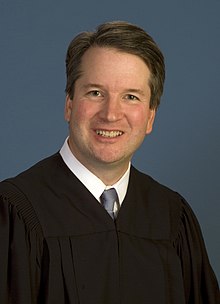Kavanaugh’s Opinion in Doe v. District of Columbia is not pro-abortion
In recent weeks, there have been a few articles in left-leaning media outlets concerning Judge Kavanaugh’s opinion in the case of Doe v. District of Columbia, with some suggesting that the opinion allows coerced abortions on people with disabilities. And to be abundantly clear, support for coerced abortions on people with disabilities would be an immediate deal-breaker for pro-life advocacy groups—which is why I was immediately suspicious of the claim. Doe is a 2007 case. How on earth could the Federalist Society, Heritage Foundation, White House bureaucrats, and all of the the dozens of pro-life organizations with an interest in the next Supreme Court nominee all fail to catch an 11-year-old coerced abortion decision while vetting Kavanaugh?
 Last week National Review published a rebuttal which called the Doe controversy a “vicious distortion” of Kavanaugh’s record and helpfully included a link to his opinion. I happen to be a lawyer, so I decided to analyze the Doe opinion myself. With the Kavanaugh hearings beginning today, now is as good a time as any to sort this out.
Last week National Review published a rebuttal which called the Doe controversy a “vicious distortion” of Kavanaugh’s record and helpfully included a link to his opinion. I happen to be a lawyer, so I decided to analyze the Doe opinion myself. With the Kavanaugh hearings beginning today, now is as good a time as any to sort this out.
I won’t keep you in suspense. The Doe case has nothing to do with abortion and the criticism is baseless.
The central issue in Doe was the District of Columbia Department of Disability Services’ procedures to authorize surgeries for a small subset of people whose intellectual disabilities prevent them from making medical decisions. Specifically, the case concerned D.C. residents for whom all of the following are true:
- The person lacks capacity, meaning that he or she “lacks sufficient mental capacity to appreciate the nature and
implications of a health-care decision, make a choice regarding the
alternatives presented or communicate that choice in an unambiguous
manner.” The capacity determination must be made by two physicians, at least one of them being a psychiatrist. Not all intellectually disabled people lack capacity under this test. - The person has always lacked capacity, and therefore the District can’t rely on any previously expressed wishes concerning medical treatment.
- The person does not have a proxy to make medical decisions for him or her. As stated in the opinion (citations omitted): “D.C. law creates a hierarchy of individuals authorized to make
healthcare decisions for persons who have been certified … as lacking mental capacity. That list includes, in order of priority: a court-appointed guardian
or conservator; a spouse or domestic partner; an adult child; a
parent; an adult sibling; a religious superior, if applicable; a
close friend; or the nearest living relative. The [Department of Disability Services] Administrator makes healthcare decisions for an incapacitated
patient only if none of the above individuals is available and willing
to do so.” - And, last but certainly not least, the potential surgery in question is not an abortion. Again, as stated in the opinion: “The D.C. Code also explicitly provides that abortions, sterilizations,
and psycho-surgeries may not be authorized, at least absent a court
order.”
To recap: when a person has a lifelong intellectual disability that has always prevented him or her from appreciating the nature and implications of a healthcare decision, and that person sadly has no guardian, spouse, child, parent, sibling, clergy member, close friend, or living relative to serve as a healthcare decision-maker, and that person has a medical issue that may call for a surgical intervention—other than abortion, sterilization, or psycho-surgery—the Department of Disability Services has to have protocols in place to address all competing considerations and try to reach an outcome that will further the person’s health.
The plaintiffs alleged that those protocols were inadequate and failed to give enough weight to the person’s wishes. The District of Columbia countered that the person’s wishes were impossible to ascertain, and in any event, the protocol did include “efforts to discuss the surgery with the patient at the level of patient comprehension.”
Judge Kavanaugh ruled that the District of Columbia’s protocols were legally sound. If you read the opinion, maybe you’ll agree, and maybe you won’t. It’s a fairly debatable issue. What’s not fair is ignoring the explicit exclusion of abortion in order to paint Kavanaugh as some eugenicist monster.
If pro-choice groups want to find an actual villain, they might look in the mirror: Roe v. Wade itself cites the notorious forced sterilization case of Buck v. Bell with approval.

Leave a Reply
Want to join the discussion?Feel free to contribute!